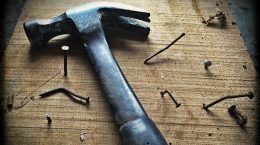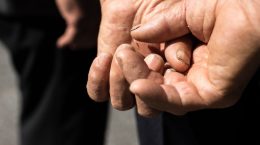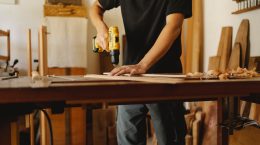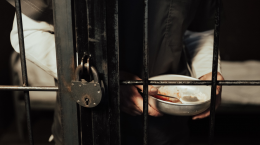Not long ago, a joint investigation of the German newspaper Die Tageszeitung and the French non-profit newsroom Disclose about the cooperation of the Swedish company IKEA with Belarusian suppliers that used labour of prisoners, including political prisoners, was published. To remind, the journalist investigation, among others, was based on the materials of Our House.
We talked to a person who experienced himself the reality of the Belarusian penitentiary system. The businessman Aliaksandr Knyrovich, from his own experience, talked about how the wood-processing business is built there.
– How do the prisoners in a colony get to the furniture production? How does that mechanism look like?
Knyrovich:
– First, I’d like to precise that exactly at the colony IK-3 there are two woodworking sites. There is a woodworking production, quite a huge one, a full-fledged workshop about 600-800 sq.m. large, with woodsawing machines and other equipment. In addition, there is a small site where furniture is assembled. However, it is not exactly what is meant by furniture production. It’s just a small site where some small-order furniture is assembled from wood chipboards. Therefore, we should probably speak about the large woodprocessing production where round timber is delivered and something is sewed out of it.
– How do people get there? What is the mechanism?
– First of all, each convict arriving to the colony gets to a two-week quarantine. It had been happening even before COVID-19. It’s a collecting room, where people first of all are checked for sanitary standards, they are tested there and kept a close eye on. People on quarantine live separately from others.
Several days before the quarantine is over, a commission takes place, where the head of the production and a quarantine officer conduct an interview and decide which workshop the person will be assigned to. There are three main variants: sewing production, wood processing and metal dismantling.
Also, there are separate cases: kitchen, or some other supporting services. However, it is a rare thing, as nobody from the quarantine usually gets there right after it. So, there are three main workshops. If a person does not have any limitations as a disabled person or a pensioner, then the person will get to one of the three workshops after the quarantine.
Later, during serving their sentence, people can be moved from one workshop to another, but it means somethings has happened. That is, in a normal, standard situation, people are not displaced from the workshop they have been assigned to into another one. In order to change the workshop, you need to justify it in some way, write an application, make arrangements, or you can be moved there as a punishment.
The most difficult site is the workshop of metal dismantling; the work there is the most stupid, manual: you actually have to separate cables from isolation and isolation from cables with a big knife. It is a form of punishment, to send a person to the metal dismantling workshop on constant basis. The process in general is as follows.
It’s what my personal experience looked like. I got to the colony and I thought that my efforts at work, actual work, would somehow influence the process of my serving the punishment in the meaning I thought if I worked well, it would help me go home earlier, for example on probation, or have my type of punishment replaced. Since for the time of over 20 months at the pre-trial detention facility I had become very tired from doing nothing, just sitting on a bed, I told them: “Guys, I have a huge experience, I’d like to work. We had a similar workshop in Kopyl, so in general, I am ready to work.” That is, I took initiative, and they assigned me to the woodprocessing workshop.
– Can an inmate refuse the job (main or additional) he is offered?
– It’s violation of the regime, and of course, it results in aggression, because if the administration has decided something, you must do it. So, the actual refusal to work is one of the serious violations, stated in the Penal Enforcement Code and is punishable with serious penalties.
Correspondingly, if the person just refuses to work, in the result, after several interactions, that person will get to a intraprison confinement. If the person continues to do that, it will be considered a serious violation. First, the punishment will be simple, like deprivation of the right to get parcels, then it will be solitary confinement, then you can find yourself at a maximum-security barrack, and finally you can find yourself “under a roof”, in prison. So, in fact you cannot refuse to work.
Besides the obligatory work, there is such a term as “being on duty” in the colony. It is anticipated that a person in a colony will take care of himself. At certain time he removes snow, then he sweeps the drill ground, some time later he does something else, but it is not a job that a normal person would not do. Toilets are washed by a separate group of people. It is an interesting story, but it has nothing to do with our current conversation. Official refusal to work is violation of the terms of serving the punishment, and there are consequences.
– Quite often one can encounter an opinion, that such work is beneficial for the inmates and they are eager to do it. Is it true?
– Generally speaking, when a person works, is busy, then of course the term will seem easier. Therefore, if that work were organized well, according to all the rules of the labour legislation, with good sanitary conditions, good equipment and so on, then of course it would be beneficial for everyone. However, since there is an absolute chaos, scarce working conditions, all the sanitary norms are violated, then of course the attitude to that work is negative.
If it were a normal work, then in most cases nobody would avoid it. If it were paid adequately, people would be happy to work. It should be said that there was a peculiarity at IK-3 colony. Since some time before the colony had been a juvenile correctional facility, the workshops are not big. So, a lot of people could be sent there, but considering the small amount of equipment, only about 200 people were kept busy.
The whole colony was about 1600 people when I got there, and about 1000 people when I was leaving. Accordingly, there is an amount of relatively normal work only for 200 people there. So, in fact those 200 people, if we take away people punished by metal dismantling work, the rest wanted to work and did it of their volition. Why? Because for everybody the salary was one ruble, but for those who really worked, had a job, like making pallets or sewing gloves, the salary was from 30 to 50 rubles.
Of course, it is peanuts, you cannot call that a real salary, but they could go to a shop three times a month and buy different little things like cigarettes, tea, sugar, soap, toothpaste, for that money. Such simple and necessary things. So, if you have nobody who “warms you up” from the outside, no relatives who can send you money, then the only way to provide tea and cigarettes for yourself is working. Therefore, there were people who were content to work and earn those peanuts willingly. Willingly in the meaning that without that job they would find themselves without money at all.
– What does an inmate working at the wood processing workshop earn? Money or anything else?
– Well, first of all, as I have already said, if he works, he earns from 30 to 50 rubles, it’s the salary. It should be said, that such salary is obviously forbidden in the country.
I believe the colony used some not very legal schemes. I think, that the colony accrued a minimum possible wage to everyone, in the amount of about 200 rubles, and then withheld by enforcement some “living expenses” and gave the rest of those peanuts to the workers.
So, besides the fact that a person earns that money, if he has worked well for a long time, without conflict, fulfilling some other tasks, like, for example, working an additional shift, or something else, then, of course, he will be the first to get some other award. It can include additional phone calls, additional parcels or additional family visit.
All that is done by normal human standards, and the colony’s, administration is in general quite loyal in that sense. That is, such people are awarded on regular basis, if they are not in some conflict relations. It is considered to be good: we cannot pay you, so let’s do something else. They definitely do not get any other material renumeration.
– How cruel is the attitude to the inmates working at the wood processing site?
– I saw real cruelty only in relation to few people, and it wasn’t about work. I cannot imagine a controller or a police officer in the colony to hit an inmate. I have never seen it happen. I cannot imagine something like that happen in the IK-3 colony, especially that it was a task from the administration. Everything is done in a completely different way.
For example, there is a “cold yard” at KP2 (the checkpoint between the living and the industrial zones). So, there is a small yard there. If the temperature is 15 below zero, then a standard punishment is to lock a person in that yard for eight hours, just to stand there for eight hours in the frost. Nobody beats that person, nobody does any other thing to him, this is the way they punish him.
That form of punishment was used regularly. In my opinion, that is sadism. The police officers themselves are afraid to conduct any other physical punishment, as they have the fear that a prosecutor’s office will arrive, or an inspector from Department of Corrections, and will punish them.
However, there is another problem. During my term at that wood processing production, due to not observance of the occupational safety regulations, about 10 fingers were cut off. It was considered to be a sort of expendable material. There was a fatality when a person with symptoms of a stroke or a heart attack was not let to go to the medical unit.
– Now, a lot of mass media are writing, that European consumers have been buying furniture and other goods produced out of Belarusian timber at the enterprises using forced labour of convicts, especially of political prisoners. Can you somehow confirm or disprove that?
– I can definitely confirm that convicts are forced to work in production, and that political prisoners are first to be forced to work there; it’s difficult for them to avoid such an assignment. If the rest, as I have already said, the absolute majority of colony residents work formally, that is, they are assigned to one workshop or another, but they work twice a week at a reserve brigade, they come, walk in rounds here and there, bring something, take something away and go back to the barrack, then political prisoners work constantly, they work every day. This is what my experience was.
Political prisoners are definitely paid nothing or they are paid 1.5 – 2 rubles a day. Less than a dollar a day. That is, you can call it slave labour 100%.
However, I cannot identify and correlate production of some kinds of wooden fragments in the colony and tie them to IKEA or any other major brands; but I am absolutely sure, that the situation with the wages and working conditions is the same in all other colonies. So, if we know, that some goods from a colony were sent to an enterprise and later to IKEA or any other world major brand, then there’s 100% certainty that there is slave labour of political prisoners in those goods.
A political prisoner cannot avoid work, and a political prisoner is not paid any decent money, because a ruble a day is not money in any case. It is a good situation, if that ruble is paid. Therefore, yes, I can confirm 100% that it is a standard practice.
– How do you estimate yourself the Belarusian prison system from the point of view of a businessman, who understands how all the processes should be organized?
– Well, it is shit! Shit on a stick! Because if I had a workshop of that size, the equipment they have, and almost free labour of political prisoners, access to the raw material (I saw that raw material arrive to the colony, it’s bought at the lowest possible prices, not for free, but at extremely low prices), and with the output of goods in the amount of 8 thousand dollars a month… In my opinion, if it were my own workshop, with the same equipment with the same number of people, the output would be at least in the amount of 50 thousand dollars a month.
Those conditions, even if the labour is free, generate appalling inefficiency. The most important is something else: no person in the colony, I am speaking about the IK-3 colony, so, no person in the colony has the aim to make an efficient production out of it. All people that I saw there have a very simple plan: to survive another day. I am speaking about the administration of the colony. So, it’s impossible to measure that work in business categories. In real life such business would not survive a month.








